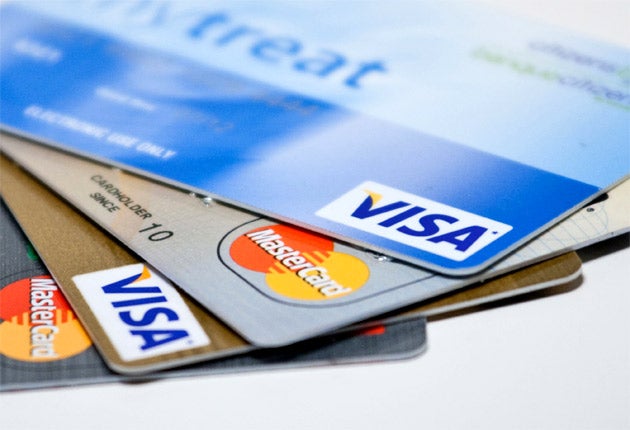Crackdown on the hidden credit card rip-off

Your support helps us to tell the story
From reproductive rights to climate change to Big Tech, The Independent is on the ground when the story is developing. Whether it's investigating the financials of Elon Musk's pro-Trump PAC or producing our latest documentary, 'The A Word', which shines a light on the American women fighting for reproductive rights, we know how important it is to parse out the facts from the messaging.
At such a critical moment in US history, we need reporters on the ground. Your donation allows us to keep sending journalists to speak to both sides of the story.
The Independent is trusted by Americans across the entire political spectrum. And unlike many other quality news outlets, we choose not to lock Americans out of our reporting and analysis with paywalls. We believe quality journalism should be available to everyone, paid for by those who can afford it.
Your support makes all the difference."Rip off" credit and debit card fees are to be investigated after a consumer group discovered customers are being charged up to 200 times the actual cost of paying by plastic.
Which? triggered the inquiry by making a super-complaint to the Office of Fair Trading about the fees charged by airlines and other companies. Growing evidence suggests that such fees are being used to generate extra income rather than cover costs.
The business regulator now has 90 days to investigate and decide whether to launch a full-scale inquiry, which could lead to the charges being banned.
At least 10 European countries, including France, Italy, Portugal and Sweden, already ban surcharges on credit cards; and five other countries, including Germany, Greece and Spain, limit the charges. In Britain, businesses are allowed to charge whatever fees they like, provided they notify customers before payment is made.
Launching a campaign against "The Great Card Surcharge Rip-off", Which? complained that "excessive" charges had become more common. It identified budget airlines as the worst offenders. BMIBaby and Flybe charged £4.50 a flight, it noted, while Ryanair billed £5 – which for a holiday for a family of four worked out at 200 times the estimated cost to the carrier.
The consumer group warned that travel agents, ferries, cinemas, and even councils, were also now charging hefty fees. Irish Ferries charged £5, while Thomas Cook and Co-operative Travel asked for 2.5 per cent. Odeon cinemas charged 75p per ticket and Vue 70p a ticket. And councils were charging fees on card payments for council tax, meals on wheels and even dog fouling fines, it said. Many companies charge the same for debit as credit cards despite debit cards card fees being much lower.
Which?'s campaign has the support of Visa and Mastercard, which are concerned the fees are damaging their reputation. According to the UK Cards Association, which represents the providers, the average processing fee for a credit card is 1 to 2.5 per cent, and 10p to 20p for a debit card. Last year Britons spent £126bn on credit cards and £288bn on debit cards.
Ryanair pointed out that passengers could avoid its administration fee by paying by MasterCard Prepaid. "Before making 'Super Duper Complaints' the clueless clowns at 'Which?' should at least get their facts right," the airline said. "Ryanair does not levy any credit or debit card payment 'surcharges'."
Other businesses said the fees subsidised their headline rates. Travelodge said that without surcharges it "would be unable to offer millions of rooms at £19 or less," while the Co-op said travel industry margins were so tight it could not absorb the extra cost.
The excuses cut little ice with Which?, whose chief executive, Peter Vicary-Smith, said: "Consumers are really fed up with paying excessive card charges. Low-cost airlines are some of the worst offenders, but excessive card surcharges are becoming ever more widespread, with everyone from cinemas and cabs to hotels and even some local authorities getting in on the act."
Which? wants companies to cover only the costs of using credit cards and to absorb debit card fees.
Consumer Focus, the government-funded watchdog, is backing the campaign. Prashant Vaze, its head of fair markets, said consumers were forced to pay out the fees. "Often they have no other option, especially for internet transactions where there is no alternative to using cards. Any debit or credit card charge should only be cost-reflective," he said.
Sandra Quinn, of the UK Cards Association, said: "Anecdotally, charging is increasing and we know that it annoys consumers – it puts them off using cards when cards are simple and offer them great protection."
* Ryanair is to introduce a ¤2 levy (about £1.76) per passenger for all bookings made from 4 April, to cover costs incurred under European passenger compensation regulation. Ryanair paid out more than ¤100m from flight delays and cancellations last year, the company said.
Join our commenting forum
Join thought-provoking conversations, follow other Independent readers and see their replies
Comments